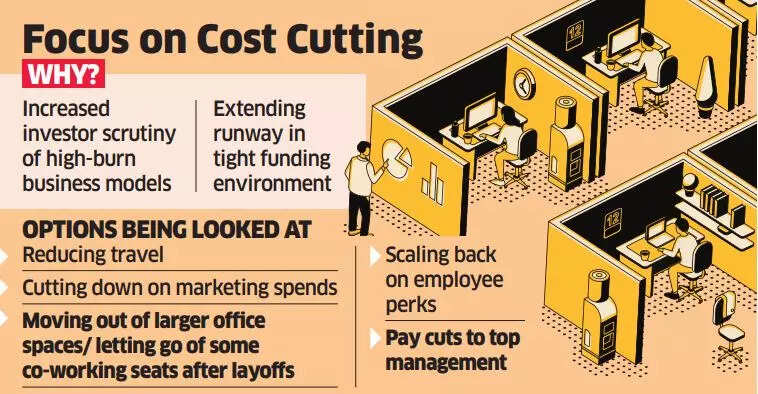
Amid a funding crunch globally, frugality and unit economics have become the buzz words among startups as they focus more on profitability and curtailing costs. Investors, founders and recruiters ET spoke to said there will be a cost-cutting drive across startups amid increased investor scrutiny of money-guzzling business models.
Marketing budgets are getting slashed, layoffs are becoming commonplace, founders and top management are taking pay cuts, and perquisites — that include free food at the workplace — are being taken away, at least at some startups for the time being.
Unacademy chief executive Gaurav Munjal, in a note this week, urged employees to “embrace frugality as a core value” and turn the edtech firm profitable as soon as possible. Munjal and the top management are taking pay cuts, with industry insiders saying that founders at some other startups may follow suit. India’s startups have also fired thousands of employees in the past few months to cut costs. At Unacademy offices, meals and snacks will no longer be complimentary, according to the CEO’s note.

Employee payroll and marketing are still the biggest chunks of expenses for startups, while travel and perks account for only 10-15%, according to estimates. Hence, cutting back on the latter is more about optics, and the sector would continue to see layoffs in the coming months, said industry insiders.
“Given the current market situation, investors are advising startups to have a runway of at least 18-24 months. High (cash) burn models are being questioned the most and are finding it hard to get investor support. Founders are therefore working on cost optimisation very actively,” said Vikram Gupta, managing partner of IvyCap Ventures.
Marketing budgets at startups have come down significantly already, said Sajith Pai, director at early-stage venture fund Blume Ventures. “They will no longer be throwing money behind vanity projects or anything that is not core to the business. If founders see that there’s a small chance that VC money will not flow like before, they will go all out to reduce the expenses-revenues gap.”
Startups that have raised large capital are under pressure and will see salary cuts for top management, lower marketing budgets and will be more watchful on discretionary expenses, said Ashish Sanganeria, senior partner at executive search firm Transearch India.
Startup founders agree that this is the time to be circumspect. While there are startups that are burning $5-10 million a month, they need to put their costs back in order, even those who have had a tighter rein on expenses will be extra cautious.
Many companies have cut down on their marketing spending by 30% to as much as 70%, said Mayank Kumar, cofounder at edtech startup UpGrad.
“Some, after layoffs, have also moved out of larger office spaces or have cut down on seats in co-working spaces to save on rental expenditure. While there are a few K-12 and ecommerce companies who are likely to cut back in a bigger way to address the cash-flow crunch and build sustainability, those in the higher education sector are in a relatively stronger place,” Kumar said.
According to Abhishek Mehrotra, chief HR officer at fintech platform Yubi (formerly CredAvenue), while his company has always been very cost-conscious, the overall industry has to be ready for a funding winter and focus on executing plans by being conscious of unit economics to tide the wave.
Some investors are optimistic, saying that many startups are still scaling up in this environment.
Prashanth Prakash, partner at venture capital firm Accel, said while the overall focus has shifted towards profitability, he doesn’t see much pay cuts being taken by top management.
“The next few quarters may see a little evening out, but there is still a significant demand for tech talent,” he said.